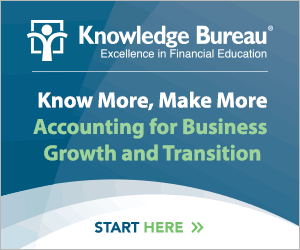Last updated: October 13 2015

The New Role for the Tax Accountant When a Business Transitions
Accounting departments in growing companies have a special role in collaborating with shareholders: to help those at the financial helm to understand not only where the business results lie today, but what resources it will need to support future growth, potential financing gaps, and how they can best addressed.
To embellish to those skills, Knowledge Bureau has just published an updated certificate course for bookkeepers, tax advisors and financial planners who wish to add value by broadening their skills in this specialized opportunity for support.
Accounting for Business Growth and Transition (formerly Accounting for Business Transitions) has been completely revised and updated by fall Distinguished Advisor Workshop speakers Jenifer Bartman, CA, CMC and Larry Frostiak, FCA, CFP, TEP as well as Alan Rowell, MFA, DFA-Tax Services Specialist who spoke at the January DAW.
“This course covers a range of issues that might be encountered during the evolution and growth of a company,” says Evelyn Jacks, President of Knowledge Bureau.. “At the end of the day, real value generated by accounting roles go well beyond the numbers to assist and support decision-making, and we have recruited some of the best minds in Canada to share that opportunity with you.”
Students are invited to learn about more about the key areas that add value, including:
- Steps an accounting department can take to have the necessary financial records and results on hand in advance of a business transition
- Understanding the due diligence process, what buyers and sellers need, and how to achieve a managed result
- How to support a business leader prior to, during, and after a transition of the business
- Understanding the strategic mindset so often displayed by business leaders in managing a transition
- How the accounting function can take steps to add value, in both day-to-day operations and times of transition
“Growing companies are dynamic places and there are a number of specialized issues that could arise during the lifecycle of a business,” says co-author Jenifer Bartman, “These include the complexities related to expanded operations, entering new markets, revising organizational structures, new consolidated financial statements, foreign exchange transactions, due diligence requirements, and approaches for structuring a business transition.
In addition, those who work in the accounting function will gain an understanding of how to take a leadership role in creating a value-centered department that could help to support the growth and development initiatives that occur over the lifecycle of a business. Students will understand:
 |
- how growth in a company could impact the accounting function
- how to work with the technical issues that could arise as a result of expanded operations, including consolidated financial statements and foreign exchange
- how the due diligence process and the financial information to be accumulated and assessed in evaluating the purchase of a business
- how to identify and accumulate the information typically provided when a business is sold
- generally about ways in which ownership and management of a business could transition, including family succession, employee succession, and sale of either assets or shares
For more information and to enroll in this course, call 1-866-953-4769 or enroll online, anytime.
